Viktar Marchuk: “Digital technology can replace paper, but nothing can replace trust.”
This interview is part of the collection “Voice of the Freedom Generation”, a living testimony to the creative and civic presence of those who have not lost their voice even in exile.
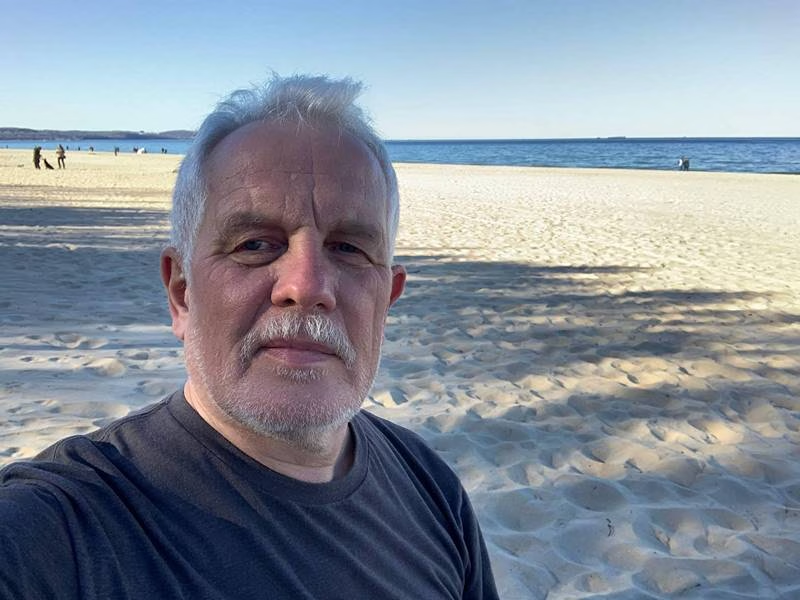
Viktar Marchuk. Photo: from personal archive
The collection tells the story of the laureates of the “Voice of the Freedom Generation” award, founded by the Belarusian PEN in partnership with the Human Rights Center “Viasna”, the Belarusian Association of Journalists, Press Club Belarus and Free Press for Eastern Europe endowment fund. The collection will be presented on November 15, 2025 at 5:00 PM during a discussion with the laureates of the “Voice of the Freedom Generation” award at the European Solidarity Center (Europejskie Centrum Solidarności, Gdańsk, pl. Solidarności 1).
I’d go down Dzerzhinsky Avenue and then turn onto Lenin Street, and just behind it, I’d find the Communist Street
You are an architect by more than just education. You have seventeen years of experience in the profession. Did architecture in Soviet Brest mirror ideology? Or was the city simply constructed “from concrete and brick”?
Nothing in the Soviet Union was built without ideology. Everything had this implication.
But what did it look like? People would walk along the streets and see street names such as Lenin, Communist, Dzerzhinsky, Kalinin,[1] Gorky, and others. But are the buildings themselves and their layout also a projection of Sovietism?
Both: some things are not simple or straightforward. On the one hand, there were names and symbols foreign to locals. On the other hand, the designers’ love and patriotism saved the city. After all, Brest had its own architectural school sprouting from the Civil Engineering Institute. We were proud of our department. Some of its graduates’ works were even featured in the magazine Arkhitektura SSSR. For example, Brest boasted an airport that received a Union award and an athletics arena. Our luminaries — Valer Kiskevich, Mikalai Pushkou, and others — have won international competitions. Including in Japan. There’s no denying that this is a great success for a provincial town.
Still, did the city garner admiration or come across as monotonous and unoriginal?
There was basically no variety in housing: prefabs, brick buildings, and standard designs. For me, as someone born and raised here, Brest has never been uninteresting or faceless. I’m in love with it. Judging professionally, however, the architecture indeed bore the imprint of the Soviet era. It’s impossible to make progress if you’re restricted by the materials and technology available to you. Something functional and somewhat beautiful had to be made out of bricks and panels.
Did you compare Brest to the neighboring Polish cities across the river and the forest?
It’s hard to believe now, but during the Soviet era, I only visited Terespol and Biała Podlaska once. I didn’t see much difference. Brest was not inferior. However, Poland has made significant progress over the past thirty years. If you compare today’s Warsaw with Brest or even Minsk, the difference is striking — and noticeable not only to experts but also to ordinary people.
Even though the situation with materials and facilities has started to improve, and there’s already an established local school of architecture… what’s the catch then?
It is the system built on creative fears, limited initiative, and comprehensive government control. However, when private developers are involved, more original and bold projects tend to emerge. In general, however, many new buildings today are not much different from Soviet-era housing. Yes, glass office buildings have started to appear, but Warsaw’s city center has been elegantly lined with them for a long time.
Did you want to achieve something groundbreaking back in the late ‘80s?
Of course. But the system was suppressing us. There was a specific Soviet canon. Many projects were rejected as too expensive or impossible. That’s why I changed professions. I realized there were few opportunities, but life in the city was changing and moving forward. Many of my colleagues have also left government organizations and set up private studios. We all lived in hope that the limitations of the Soviet system would soon disappear, allowing us to build whatever we deemed necessary.
Let’s talk about Brest more broadly, including its reputation for memorials and monuments, as well as the reconstruction of its city center. Did ideology play a significant role here, too?
Absolutely. Today, the Sovetskaya pedestrian street is almost entirely renovated. Old buildings and houses were destroyed, including some very old, quaint monuments.
There was a story about a Brest resident who refused to be evicted from a privatized building in the city center. He wasn’t afraid of anyone. “My house is my fortress!” Court hearings followed. The authorities promised to preserve the authentic walls. As a result, the house was destroyed, and a new hotel was built in its place. No one was going to keep the promise to rebuild what had been demolished. This is how the entire Sovetskaya Street was destroyed. Ideological new-builds replaced history. A centuries-old memory was destroyed for the sake of cheap beauty and forgery.
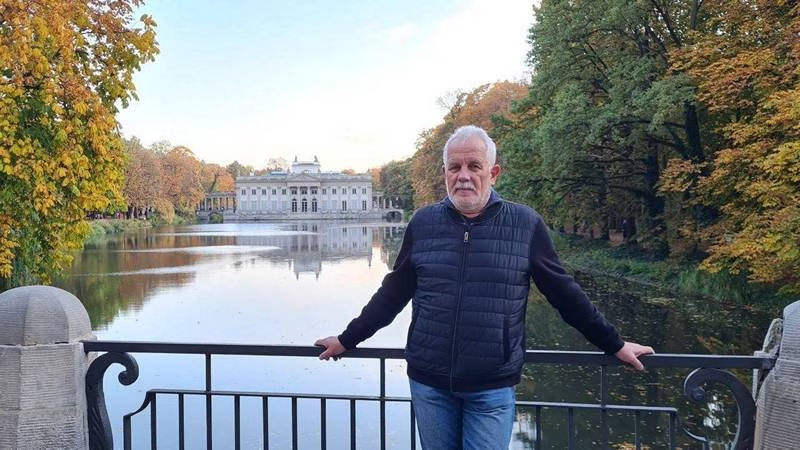
Viktar Marchuk. Photo: from personal archive
What about the law, buildings of historical and architectural merit?
The law? Whoever controls Themis has rights. State protection documents were meaningless — everything was destroyed and replaced by new buildings. But here’s something interesting: Russians who come to Brest are impressed by this new image. That’s the story.
What about the famous monument dedicated to Brest’s millennium celebration? It features columns with bas-relief and statue panels, as well as an angel at the top. It seems like a beautiful idea, but the result is…
Aliaksandr Palyshenkau led the city executive committee at that time. He was determined to leave his mark on history. And he did. Ten years before the anniversary celebration, construction of the monument began. A situation similar to today’s debates about who to commemorate in the Belarusian pantheon and who to exclude occurred. Roughly, Charhinets[2] vs Bykau.[3] Consequently, some promising characters who could have been included in the monument were simply removed for some ideological reasons. I know for sure there were more potential figures in the initial version than in the final version. If I am not mistaken, at least two people did not pass the selection process: Priest Athanasius of Brest and Jagiello, the Grand Duke of Lithuania and King of Poland, who granted the city Magdeburg rights. As a result, Vytautas the Great is featured, but Jagiello is not. Unfortunately, I can’t remember exactly which other worthy historical figures were discussed.
And the monument itself proved controversial.
The height was calculated relative to the surrounding buildings, which made sense. The building does not dominate the space. But they made many mistakes. It was built hurriedly. The monument’s design has undergone many revisions. Their goal was to have it ready in time for the City Day celebration on July 28, 2009. As a result, more than 70 errors were made on the twelve bas-reliefs featuring Belarusian text. The letter “ў” was simply ignored. We wrote about it in our newspaper. It got to the point where Palyshenkau’s name was engraved in a hidden spot — and with a mistake. As they joked then, with a “messtake”. He craved fame, and he found it in the most absurd way imaginable. The opening looked somewhat farcical. Several months after this loud celebration, mistakes were corrected.
I had some experience. But the main thing was that I had no fear
At some point, you left architecture to pursue a career in journalism. After spending seventeen years building houses, you started designing pages and texts. What made you take this step? Was it disappointment in the profession? Or did you realize that the country needs a different building material — information?
I have no regrets regarding my chosen profession. I was young and full of energy. However, the Soviet dullness and stagnation weighed me down. I wanted to breathe more freely and do what I thought was necessary. I left architecture to work in a small business for a while. Then I realized: I have my own thoughts and vision, so I must speak out. Otherwise, what kind of free person am I? By that time, the independent newspaper Brestsky Kurier had already been established in Brest. My longtime colleague from Zhilprojekt, Mikhail Yanchuk, also found his place in it. He wrote an author’s column once a week. I was captivated by this experience. I tried following the same path, and it worked the first time. That’s how my new life began. I thought it was for a while, but I was wrong. However, I don’t regret it.
What drew you to journalism?
To me, it seemed very similar to architecture. A creative element is present here, too, and it is equally important to have structure and clear logic. Like a building, a text must have a foundation, structure, and shape. Therefore, the transition did not feel like a break to me. On the contrary, I felt like I belonged there.
But you left Brestsky Kurier. Why? Was it a conflict of concepts, frustration with the team, or an ambitious desire to create something on your own?
I can blame the disappointment on this. The team was talented and had great potential. I wrote texts and did layout work. I even tried my hand at being an executive secretary for a while. But the way the work was organized was completely unsatisfactory. I put forward a set of reforms, but received no support at all. The fervor had waned, the potential had been used up. That’s when I decided to start my own project. I would be my own commander and chief of staff.
And you also would have to write, shoot, and edit on your own. Brest is not Minsk, which has many journalism graduates. Where did you look for people? How did you find the resources?
Brest had its own talents — the freelance writers who published in Kurier, and young people who were already trying their hand at writing and beginning to spread their wings. Additionally, a journalism faculty was established at the Pedagogical Institute in the early 2000s. As for my organizational skills, I was once the chairman of the trade union committee at Zhilprojekt, which had over a hundred employees at the time. So I had some experience. But the main thing was that I had no fear.
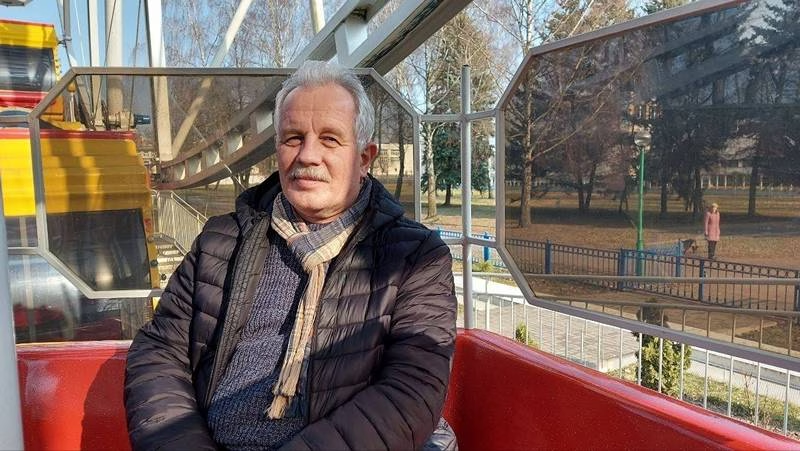
Viktar Marchuk. Photo: from personal archive
At that time, there was already intense competition in Brest from newspapers such as Zarya, Kurier, Vecherny Brest, and others, with a readership density that might even have exceeded that of the capital. The editorial offices were home to a multitude of renowned journalists. Did this affect your zeal? Did you feel supported by the “celebrities”?
I didn’t expect any help. The main obstacle is not gathering people, but registering a newspaper. To accomplish this, it was necessary to obtain permission from the local authorities. The officials answered, “We already have enough publications. Why would we need something else?” It was an almost insurmountable obstacle. Incredibly, we managed to get through it.
Were the relationships between publications of the “Brest State Newspaper Empire” also imperialist? Was the main goal to capture as many readers and advertisers as possible?
By that time, the state’s monopoly on information was no longer sterile. There were two private newspapers, the Kurier and the Vechyorka, though the latter was partially state-owned. However, there was no support from them, nor could there have been. A similar phenomenon occurred in the media business, as in architecture, with many editors-in-chief transitioning from government publications, particularly Zarya. A general sentiment of change in times prevailed, accompanied by a growing sense of freedom and an increased potential for self-realization. I wasn’t alone in this movement; I just got started a little late.
To catch up, I had to study Press Law, draft the charter, and write all the documents myself. We needed money, so we attracted co-founders. We were also lucky to get an essential official document saying, “The Brest City Executive Committee does not object.” It was a key certificate. I brought it to the Ministry of Information in Minsk. To be honest, I estimated the chances of registration at fifty-fifty. But they registered it! This was the first registration of a socio-political independent publication in many years before that, by the way.
What a special day!
Absolutely. Upon my return to Brest with the certificate, the city executive committee was taken aback: no one had anticipated it. This is how we started the publication.
The first issue was published on November 18, 2002. Do you remember how it was received?
Competition was intense: Vechyorka sold 40,000 copies, Kurier 17,000, and Zarya just under 30,000. And we started with just 2,000.
Our orders were printed on an antiquated machine that couldn’t even bind 12 pages. I spent hours at the printing house before taking everything to the editorial office, where we folded the newspaper by hand. The printing workers would make a “cuckoo” sign. “You’ll lose money in two or three months, and then you’ll run away. End of story.” But we persevered.
So, there was some kind of conceptual idea that set the Brestskaya Gazeta apart from the rest?
The idea is straightforward: to write honestly and concisely. We provided coverage of events as they unfolded. The other publications had a fairly flexible backbone, traditionally looking to see which way the wind was blowing. We relied on integrity.
How did you organize the work?
The team was small, with about five staff members and several freelancers. There were only two computers: one for layout and one for typing. Our first office was located in a hotel. I delivered newspapers around the city myself.
However, Brest had a strong distribution network. Was it helpful in any way?
That’s right, and this is a significant advantage: At that time, more than 50 private distributors were selling the press. Essentially, it’s a commercial system. Some sold 400–500 copies and made good money. Like in a scene from a film, people stood at street corners shouting out the day’s front-page headlines. On Shevchenko and Masherov Boulevards, for example. During traffic jams, they ran between cars, selling the press through the windows. It was a lively market. Other cities lacked something like that. We lived off it.
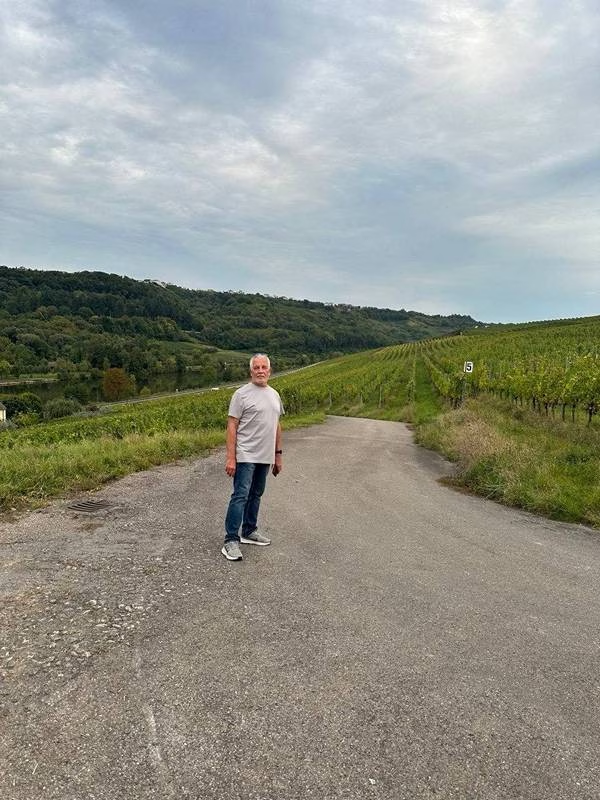
Viktar Marchuk. Photo: from personal archive
The buyers weren’t keen on paying for a new, unfamiliar newspaper, were they?
That’s right. The distributors would come to the printing house themselves to collect Vechyorka and Kurier. This was not the case for our newspaper. I had to beg them to take it for sale. Not everyone agreed. Gradually, however, Brestskaya Gazeta became popular.
When a distributor sold 500 copies of Vechyorka in an evening, and only a dozen of yours, didn’t it feel discouraging? Didn’t you feel a bit tight-fisted? Didn’t you ever want to throw away your pen and give up?
No. On the contrary, it motivated me. I thought, “If they can sell that much, then we can too.” Yes, it was hard at times — moments of weakness crept in, but I pushed away those foolish thoughts. There was a stronger desire to keep going and reach the finish line.
Let’s go to the square, feed the pigeons!
It’s really like in the army — three-kilometer run, and whether you can or not, you go forward with the whole company! But what about the soul of the newspaper itself? What was the atmosphere like in the editorial office, and how did it interact with the city?
We relied on courage and honesty, which lifted our spirits and gave us the bravery to be fearless. We tackled hot topics and didn’t shy away from trouble. And the readers felt it.
The battery factory[4] — a hazardous industry, your journalistic mission, and the birthplace of Brest’s civil society. Am I capturing the essence of that moment correctly?
Absolutely. Kurier was no longer there, and Vechyorka was avoiding the topic, but we brought it up. The editorial office has become a meeting place for the action group. We organized live streams. Aliaksandr Kabanau’s[5] famous phrase was first said in the editorial office: “I’m going to the square to feed the pigeons.” That’s how it all started. Initially, few people responded to the call. In fact, there were more police officers than participants. But the protest gradually grew in size.
Then, about 40,000 signatures opposing the construction of the plant were collected. For a city of 300,000 people, that’s impressive. What motivated you more: the fear of lead pollution or the feeling of being excluded from the decision-making process?
People were not afraid of repression; they were concerned about their children’s health, clean water, and air quality. It was genuine solidarity — firm, imbued with a high sense of civic duty and human dignity. I believe the battle over the battery factory has become the prologue to 2020. The community has discovered its own power. It also gave rise to new leaders who appeared out of nowhere but knew how to explain complex things in simple terms.
The plant was eventually built, though. Is it a defeat or something else?
Society did not lose, neither in the case of the harmful industry, nor in the events of 2020. We have gained experience in association, solidarity, and joint struggle against what people find unacceptable. It won’t go away, even under today’s intense pressure. It will survive the challenging times. It will have its say.
The authorities do have tools to overcome civil resistance. However, the mere occurrence of this event — the fact that Brest residents united and said “no” — can be considered a milestone in the development of a civil society.
Absolutely. It’s impossible to win everything at once. It’s a process. The experience itself has already become valuable. It doesn’t appear right away; it develops over time through trial and error.
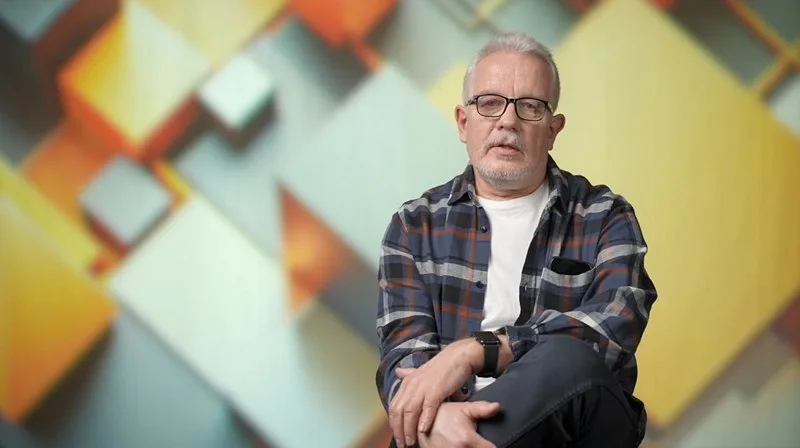
Viktar Marchuk. Photo: from personal archive
Let me tell you my version of the story. It began earlier, back in 2016, when entrepreneurs rebelled against Decree No. 222, which paralyzed their work. At that time, Brest was the site of massive protests, which were perhaps the largest in the country. Were these protests driven by mercantilism, a struggle solely for one’s own interests? Or was it a sign of a more profound social shift and the growth of self-awareness?
I guess the latter. The citizens of Brest have always been more freedom-loving and independent. And in this sense, our city is very similar to Minsk.
It turns out that the entrepreneurs’ protests and the subsequent struggle against the battery factory are part of the same whole. This marks the birth of an active civil society. Could Poland’s proximity have played a role? We went there, witnessed life on the other side of the border, and wondered, “Why am I worse off?”
Yes, the proximity to the border and the opportunities it offers are essential. We had a small gateway to Europe, allowing us to witness firsthand how rapidly and positively the neighboring country was evolving and leaving us behind. However, not everyone perceived it the same way. Someone just made a trade and was satisfied with the outcome. Still, most of us still wanted our homeland to resemble Poland. This explains why the protests in Brest and Hrodna were so active.
Alongside the European wave of change, independent media also played a crucial role. A robust journalism school emerged in Brest in the early 2000s, and it was the media that sparked the surge in civil unrest.
Indeed. The townspeople felt more like a community thanks to independent newspapers. We have always supported initiatives proposed by our readers. We provided a platform when they came with interesting offers: roundtable discussions, live streams. That’s why we were seen as part of the civil process. After the authorities shut down the newspaper, people called and asked, “When will you resume publishing?” for several more months. It was a sign of trust.
The regional press is often seen as the second tier compared to the metropolitan press. Perhaps the regions enjoyed more air and freedom, as well as more risk?
That’s right. This explains why there are so many arrests and instances of persecution in media-rich cities like Brest, Baranavichy, Hantsavichy, and Hrodna today. People trusted their own publications more than the official national ones. We provided the audience with truthful information, and they supported us in return. Not only financially. The residents of Brest’s love and devotion warmed my soul.
Gather your strength, rise, and start again from zero to thousands of readers
Finally, we get to you crossing the border. You had to start over after the ban on printing, searches, and equipment seizures. How did a new editorial team emerge in exile from the ruins?
We have indeed built ourselves from the ground up twice: the first time in 2002, and the second time in 2021. We left with nothing but the website and social media accounts. However, we received significant support, which enabled us to rebuild our team and resume our work. I am proud to say that today, we have reached a much higher level than in Belarus. We now have numerous sites, not just one. Life has forced us to stay up to date and flexible with multimedia.
Go ahead and brag about the facts and figures!
In addition to our website, we have ten social media accounts. Today, we have about 780,000 subscribers and 30–42 million viewers each month. Five years ago, figures like these were unimaginable. This is the result of our expansion into different channels. After all, experience has shown that the site is vulnerable. It has been blocked several times a week, and our domain name has even been taken away. I had to transfer everything to a European hosting service and constantly create new mirror sites.

Viktar Marchuk. Photo: from personal archive
It surely demanded retraining both personally and as a team. Was that too much to handle? Especially for a chief editor who isn’t in his twenties. Where do you source the energy to keep the team going?
Specific technical details are the responsibility of other colleagues. But I also learned a lot of new things. I learned to rollerblade at 55 in Belarus. Then, at 62 and in exile, I learned to edit videos. By the time I was 65, I had even created a video with my avatar generated by artificial intelligence. That’s okay. With limited human and material resources, you have to teach yourself new things.
What keeps you in this profession?
Probably the habit of being abreast of events. This job is great because it keeps me busy, mentally stimulating, and physically active. My job is really satisfying, so I’m not growing tired of it. Even if you have to work 12 or even 16 hours a day, this rhythm has become a part of life. I can’t do it any other way. Why not, as long as my health allows? A workaholic is incurable.
You could be a retired man on vacation. What motivates you to keep up this pace?
Exactly: I could have been retired. However, I was forced to leave the country a few months before I could legally apply for retirement benefits. So I also have personal scores to settle with today’s Belarusian authorities. I hope to demand what’s mine at the right time.
While it is essential, it is not the primary motivator. More significant is another thing: I see that many thousands of people continue to read, watch, and react to our texts and videos. So they still need us.
Therefore, I want to see them face-to-face, not just through a screen. My dream is for Belarus to become a free and peaceful European country where people can live without suffering. And as long as I can, I will work for that reality.
If someone were to create a portrait of Brest today in collaboration with artificial intelligence, what do you think would be the dominant theme of that artwork?
People who didn’t give up. In 2020, I saw crowds adorned with white-red-white banners. I think the flag bearers have remained. They were silenced, yet they didn’t change. The Brest volcano has just gone dormant. But it will definitely wake up.
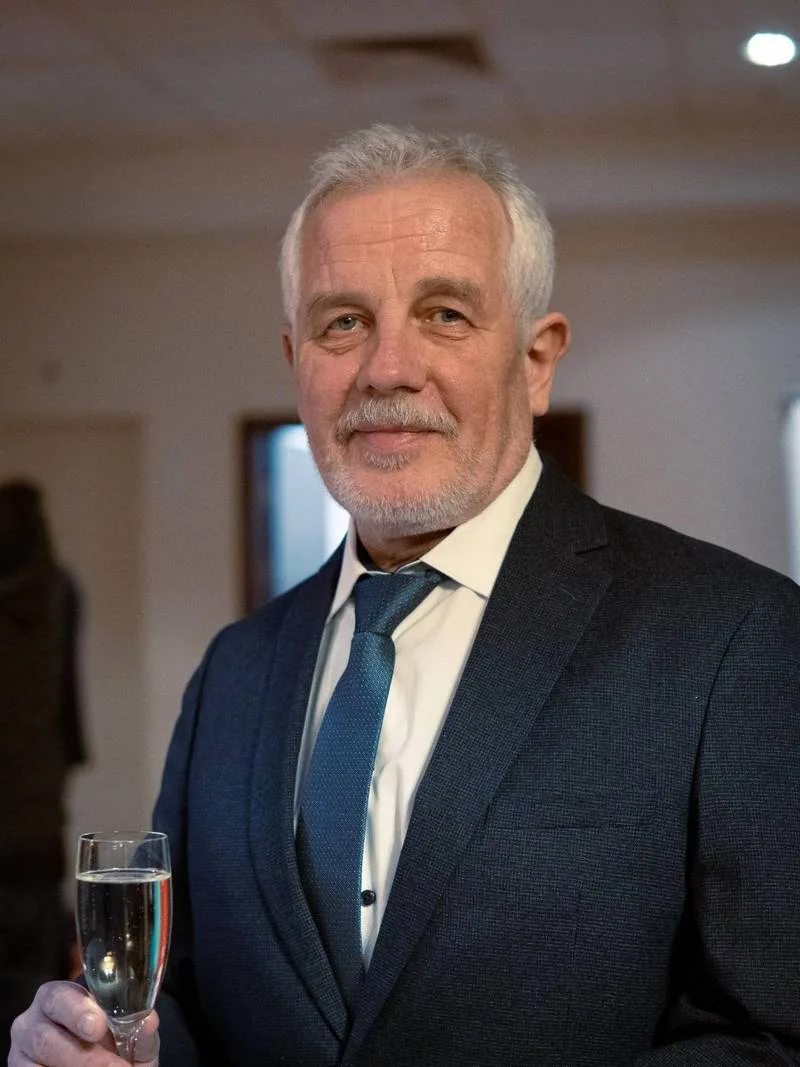
Viktar Marchuk. Photo: from personal archive
Let’s imagine that Belarus is free and peaceful. Poland lifted the barrier, and the light turned green to enter Belarus! What does returning home mean to you?
I can’t wait to get back to the place where I was born and spent most of my life. I want to finish my life in my homeland, where my parents and brother are buried.
I dream of walking down my favorite streets with my grandchildren. I have four of them, and they were all born outside of Belarus. They have never been to Brest. I really want to show them my beautiful city and tell them where everything was and how we lived. It’s such a simple human desire.
I hope that one day there will be no Lenin Street, Communist Street, or Dzerzhinsky Street. After all, we have our own outstanding and worthy personalities from both the distant past and the present.
Here are three final questions. First, is Brest a city of the future or a relic of the past?
The city of the future, built on the foundation of a bright past.
Second, what do you think will guarantee the survival of journalism — the traditional printed format, the increasingly dominant digital one, or the trust of your peers and audience?
The trust. If someone likes a publication, they reach out for it today, tomorrow, and the day after tomorrow. Without emotional contact, there is no audience.
Third, is there still a seed of community left at home that could retake root after the repression?
I’m sure there is. It’s just that the seed is dormant now because it’s winter. But it will definitely sprout.
The project “Voice of the Freedom Generation” is co-financed by the Polish Cooperation for Development Program of the Ministry of Foreign Affairs of the Republic of Poland. The publication reflects exclusively the author’s views and cannot be equated with the official position of the Ministry of Foreign Affairs of the Republic of Poland.
[1] Mikhail Kalinin was a Soviet politician and Russian Old Bolshevik revolutionary who served as the nominal head of state of the Soviet Union from 1919 until his resignation in 1946.
[2] Mikalai Charhinets is a Belarusian politician and writer, repeatedly criticized for his pro-government stance and propagandistic literary works. As head of the Public Morality Council and the Union of Writers of Belarus, he has been associated with censorship and support for authors loyal to the Lukashenka regime.
[3] Vasil Bykau was a Belarusian dissident and opposition politician, junior lieutenant, and author of novels and novellas about World War II.
[4] Brest battery plant – a major local environmental conflict. Residents protested weekly on the main square, pretending to feed pigeons to bypass the ban on unauthorized rallies. Despite Lukashenka’s unfulfilled promise of a referendum, the plant opened in 2021 and announced a prolonged shutdown with staff cuts in 2025.
[5] Aliaksandr Kabanau – vlogger from Brest, author of the People’s Reporter YouTube channel, and press secretary for Sviatlana Tsikhanouskaya’s nomination group. Before the election, he was extensively covering the battery factory protests in Brest. Arrested in June 2020, he was sentenced to three years in prison for “organizing actions that constitute a severe breach of public order” and “insulting a government official.” Released in December 2022 after serving the full term with his health severely deteriorated, Kabanau left Belarus.
 @bajmedia
@bajmedia
